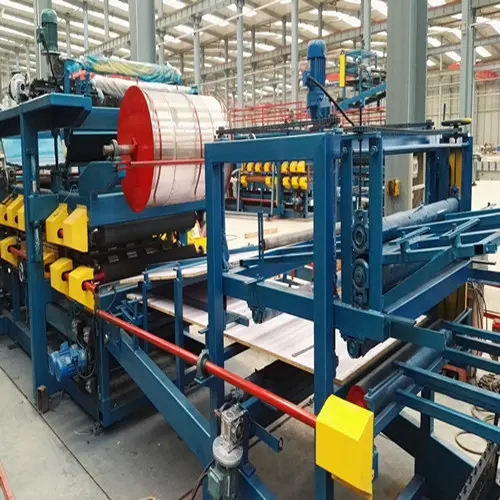
The Development and Applications of Corrugated Sheet Rolling Machines
Corrugated sheet rolling machines are essential in the production of corrugated iron sheets, which are widely used in construction, roofing, and various industrial applications. The corrugated design enhances the structural strength and durability of the sheets, making them ideal for different environments. In this article, we will explore the significance of corrugated sheet rolling machines, their working principles, various applications, and advancements in technology that have turned them into a vital part of the manufacturing industry.
Working Principle
A corrugated sheet rolling machine is designed to convert flat sheets of metal into corrugated profiles through a systematic process of feeding, forming, and cutting. The process begins with the input of flat metal sheets, usually made from galvanized steel or Aluminum. The machine then employs a series of rollers, each crafted with specific profiles that gradually shape the flat sheets into the desired corrugated form.
The rollers apply pressure and manipulate the metal’s properties through a bending process, creating precise corrugations at regular intervals. After the sheets are formed, they can be cut to the required length using an integrated cutting mechanism. The efficiency of this machine lies in its ability to produce a high volume of tailored corrugated sheets with minimal manual intervention, resulting in high productivity and reduced labor costs.
Applications
The versatility of corrugated sheets made through rolling machines offers numerous applications across various sectors. One of the most prominent uses is in roofing materials, where corrugated sheets provide a lightweight yet robust solution for constructing roofs. Their ability to resist environmental challenges, such as rain, snow, and UV rays, makes them an ideal choice for both residential and commercial buildings.

In addition to roofing, corrugated sheets are extensively used in wall cladding, providing aesthetic appeal while ensuring insulation and weather resistance. The sheets find utility in industrial sectors for constructing partitions and creating storage facilities, combining functionality with cost-effectiveness. Furthermore, they are utilized in manufacturing containers, packaging, and even as components in electronic devices, showcasing the breadth of their applications.
Advancements in Technology
The advancement of technology has significantly improved the efficiency and capabilities of corrugated sheet rolling machines. Innovations such as computer numerical control (CNC) technology have enabled these machines to achieve higher precision and customization in production. Operators can now input specifications digitally, allowing for rapid changes in design without the need for extensive manual adjustments.
Moreover, the integration of automation and robotics has streamlined the rolling process. Automated feeding systems can handle large metal sheets, while robotic arms can assist in stacking and packaging the final products. These enhancements reduce the risk of human error and increase overall safety in manufacturing environments.
Sustainability has also become a critical focus in the development of corrugated sheet rolling machines. Manufacturers are now integrating technologies that minimize waste and energy consumption, making the production process more environmentally friendly. Additionally, advancements in material science are leading to the use of recyclable materials, further promoting sustainable practices in the industry.
Conclusion
In summary, corrugated sheet rolling machines play a crucial role in the modern manufacturing landscape. Their ability to produce durable, lightweight, and versatile corrugated sheets supports various applications across multiple industries. As technology continues to evolve, these machines are becoming more efficient, precise, and sustainable, ensuring their relevance in the ever-growing demand for innovative construction and manufacturing solutions. The future looks promising for corrugated sheet rolling machines, highlighting their importance in shaping the industries of tomorrow.